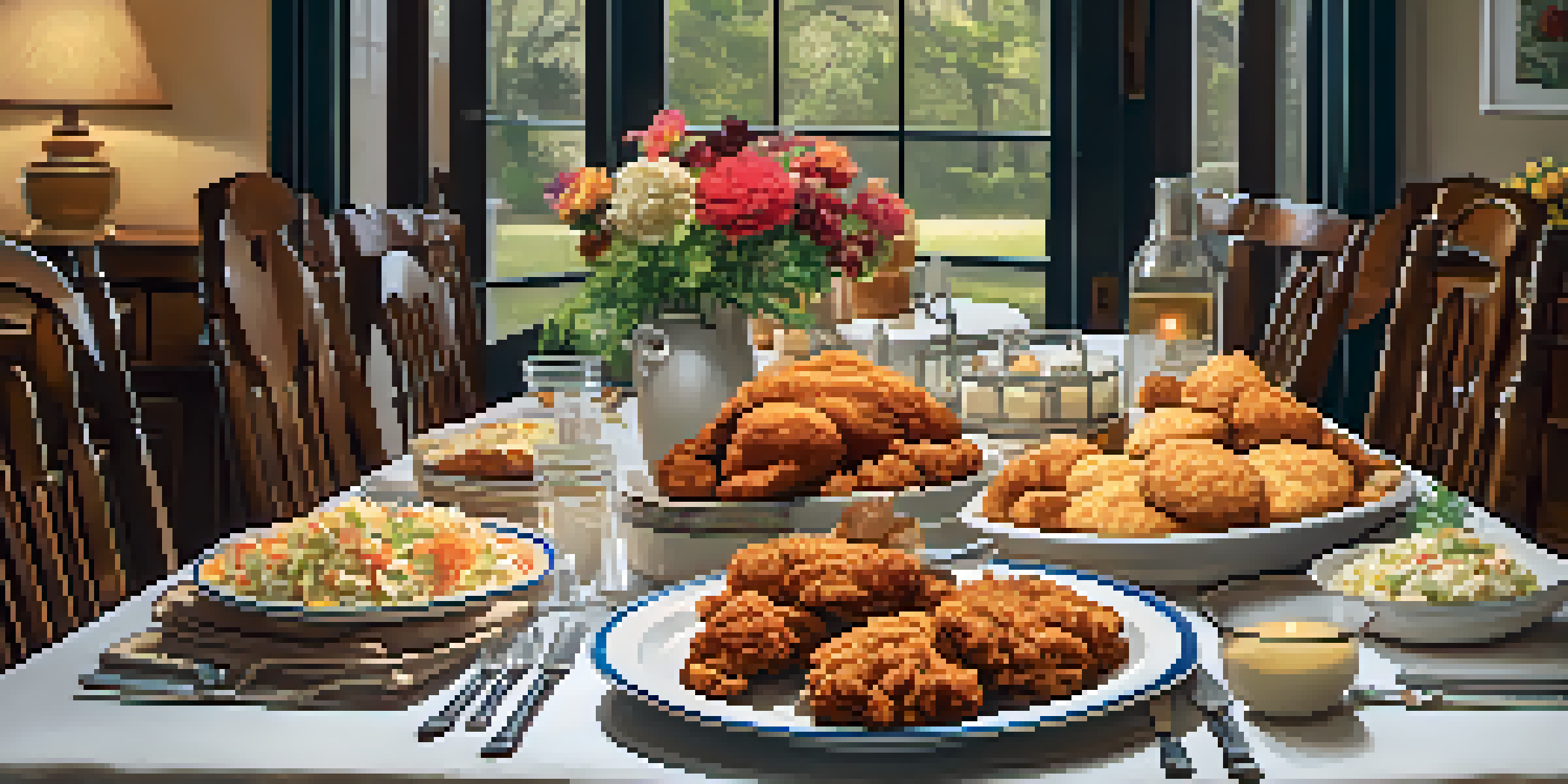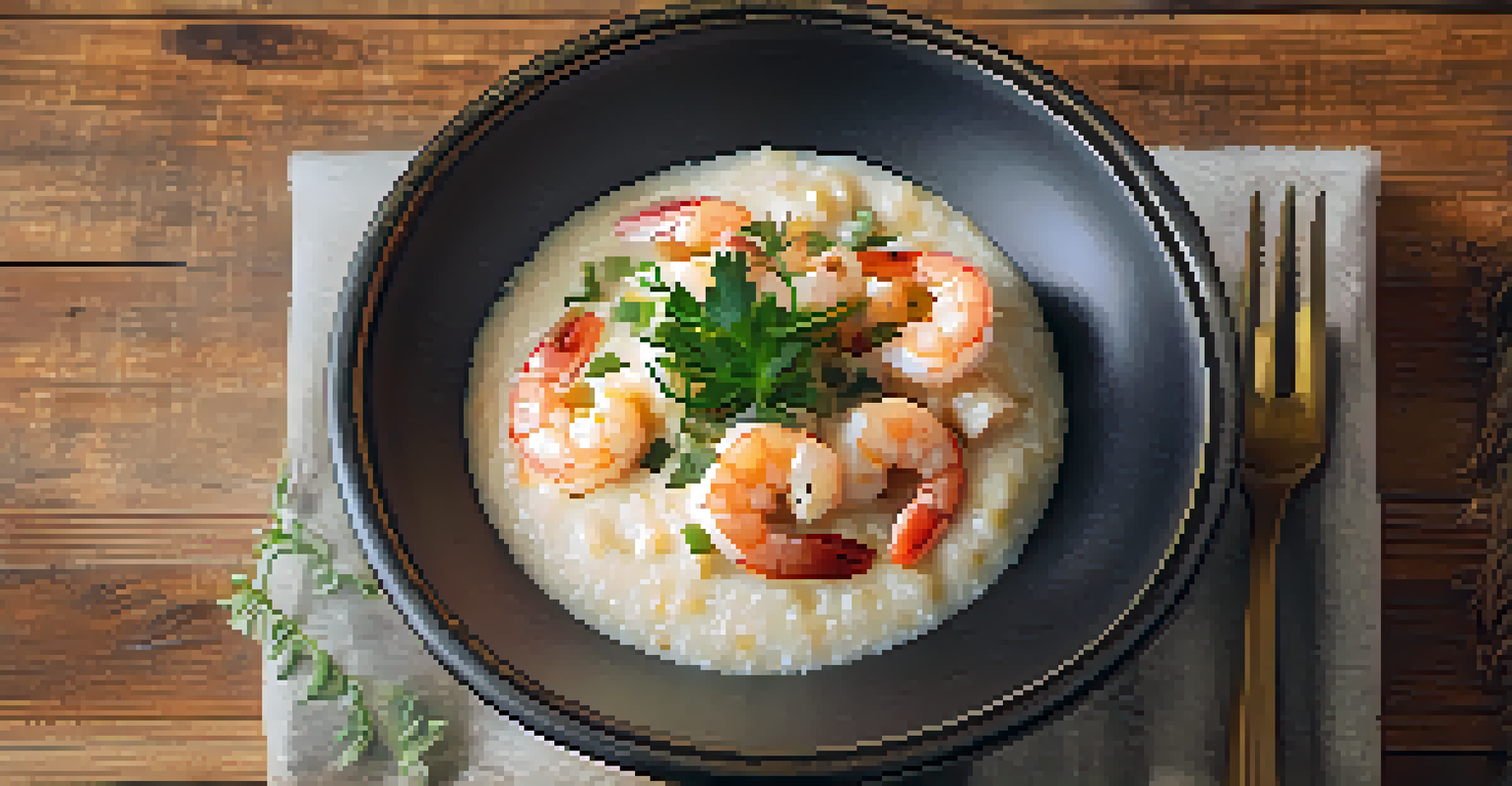Exploring Southern Comfort: Culinary Heritage in the South

The Roots of Southern Cuisine: A Tapestry of Cultures
Southern cuisine is a vibrant blend of various cultures, including Native American, African, and European influences. This melting pot of traditions has created a unique culinary landscape where flavors and techniques intertwine beautifully. For example, the use of cornmeal in dishes like cornbread reflects Native American roots, while the frying techniques are often attributed to African American culinary practices.
Food is our common ground, a universal experience.
Many Southern dishes tell stories of the past, connecting generations. Take gumbo, for instance; it's not just a dish but a symbol of Louisiana’s Creole heritage, showcasing how different ingredients come together harmoniously. Each spoonful provides a taste of history, culture, and community, reminding us of the shared experiences that shape our food.
As we explore Southern comfort food, it’s essential to recognize the cultural significance behind each dish. From the humble beginnings of collard greens to the celebratory nature of a shrimp boil, Southern cuisine is a testament to resilience and creativity, reflecting both the struggles and triumphs of the Southern people.
Key Ingredients That Define Southern Comfort Food
Southern comfort food relies heavily on a few key ingredients that are staples in many households. Think of items like corn, rice, beans, and a variety of meats, which are often found in classic recipes. These ingredients not only provide sustenance but also evoke nostalgia, reminding many of family gatherings and cherished memories around the dinner table.

One standout ingredient is buttermilk, which is used in everything from biscuits to fried chicken. Its tangy flavor and creamy texture elevate dishes to new heights, making them irresistibly comforting. Similarly, the use of spices, such as cayenne and paprika, adds a kick that embodies the Southern spirit, bringing warmth to every bite.
Southern Cuisine's Cultural Roots
Southern cuisine is a rich tapestry influenced by Native American, African, and European traditions, creating a unique culinary landscape.
Moreover, the farm-to-table philosophy is deeply rooted in Southern cooking. Many chefs and home cooks prioritize fresh, locally sourced ingredients, connecting the food to the land. This approach not only supports local farmers but also enhances the flavors, creating a dining experience that is both satisfying and sustainable.
Classic Southern Dishes Everyone Should Try
When it comes to Southern comfort food, there are some classic dishes that simply cannot be overlooked. Fried chicken is perhaps the most iconic, crispy on the outside and juicy on the inside, it's a dish that brings people together. Served with sides like creamy coleslaw and mashed potatoes, it’s a meal that warms the heart and soul.
Cooking is like love. It should be entered into with abandon or not at all.
Another must-try is shrimp and grits, a dish that showcases the coastal influences of the South. Creamy grits paired with succulent shrimp, often sautéed with garlic and spices, create a flavorful combination that’s hard to resist. This dish exemplifies how Southern cooking can transform simple ingredients into something extraordinary.
Don't forget about the sweet endings, either! Pecan pie and peach cobbler are two desserts that highlight the South's bounty of fruits and nuts. Each bite is a sweet reminder of the region's agricultural richness and the love that goes into every homemade treat.
The Role of Hospitality in Southern Dining
Southern dining is more than just the food; it’s about the experience of hospitality that accompanies every meal. In the South, it's common for families to gather around the table with open arms, sharing laughter and stories. This culture of hospitality is what makes Southern comfort food so special, creating lasting memories that go beyond the plate.
Guests are often treated like family, and it’s not unusual to see a spread of dishes laid out for everyone to enjoy. This communal approach to dining fosters a sense of belonging and connection, reminding us that food is a universal language that brings people together. Whether it’s a Sunday dinner or a holiday feast, the emphasis on sharing is a hallmark of Southern hospitality.
Key Ingredients of Comfort Food
Staple ingredients like corn, buttermilk, and spices define Southern comfort food, evoking nostalgia and supporting local farmers.
Moreover, the act of cooking for others is seen as a labor of love. Grandmothers pass down recipes to their grandchildren, instilling a sense of pride and tradition. This cycle of sharing food and stories not only enriches the dining experience but also strengthens the bonds of family and friendship.
Modern Takes on Southern Comfort Classics
While traditional Southern comfort food holds a special place in our hearts, many chefs are putting modern twists on classic dishes. This fusion of old and new creates exciting flavors that appeal to both nostalgic palates and adventurous eaters. For example, you might find fried chicken served with a spicy honey drizzle or collard greens sautéed with bacon and a hint of citrus.
These modern interpretations often reflect contemporary dietary preferences, such as vegetarian or gluten-free options. Chefs are innovating to ensure that everyone can enjoy the rich flavors of Southern cuisine, regardless of their dietary restrictions. This inclusivity allows Southern food to reach a broader audience while still honoring its heritage.
Additionally, the rise of food trucks and pop-up restaurants has made Southern comfort food more accessible than ever. These mobile kitchens often experiment with traditional recipes, offering unique takes that surprise and delight diners. The adventurous spirit of Southern cuisine continues to thrive, showcasing its ability to evolve while maintaining its comforting roots.
The Influence of Southern Cuisine on American Food Culture
Southern comfort food has significantly influenced American food culture, shaping the way people think about home-cooked meals. Dishes like barbecue, biscuits, and jambalaya have transcended regional boundaries, becoming beloved across the nation. This widespread appreciation highlights how Southern cuisine has woven itself into the fabric of American dining.
Moreover, the Southern emphasis on community and sharing has inspired culinary movements that focus on farm-to-table dining and local sourcing. Chefs and home cooks alike strive to create meals that celebrate seasonal ingredients and honor their origins. This trend has fostered a deeper connection between diners and the food they consume, emphasizing the importance of sustainability.
Modern Twists on Classic Dishes
Chefs are innovating traditional Southern recipes with modern flavors and dietary inclusivity, ensuring the cuisine evolves while honoring its roots.
Furthermore, Southern cuisine has sparked a resurgence of interest in heritage cooking techniques, encouraging a return to traditional methods. As people seek authenticity in their food experiences, they are turning to Southern recipes that have been passed down through generations. This revival not only preserves culinary heritage but also highlights the importance of storytelling in food.
Preserving Culinary Heritage Through Southern Cooking
As we explore the culinary heritage of the South, it’s crucial to consider how we can preserve these traditions for future generations. Many chefs and home cooks are dedicated to keeping the stories behind their recipes alive, ensuring that the cultural significance is not lost. By teaching younger generations the art of Southern cooking, they pass down not just recipes but also the values and traditions that accompany them.
Community initiatives, such as cooking classes and cultural festivals, play a vital role in this preservation effort. These events provide opportunities for individuals to learn about Southern cuisine while engaging with the community. They create a space where stories can be shared, and connections can be made, fostering a sense of pride in the region's culinary heritage.

In the digital age, social media also serves as a powerful tool for preserving and promoting Southern cooking. Food bloggers and influencers celebrate traditional recipes, sharing their personal stories and experiences. This online platform helps reach a wider audience, ensuring that the rich history of Southern cuisine continues to thrive in an ever-changing food landscape.